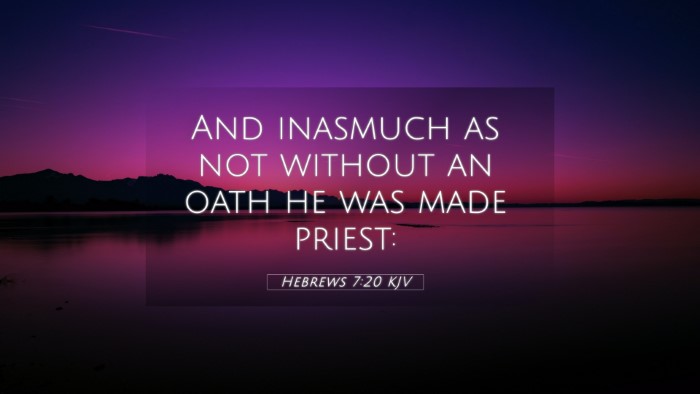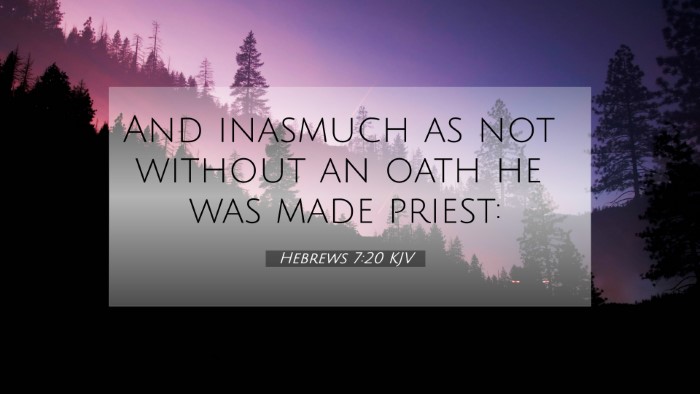Bible Verse Meaning and Interpretation of Hebrews 7:20
Verse Context: Hebrews 7:20 states, "And inasmuch as He was not made priest without an oath" (NKJV). This verse emphasizes the distinction of Christ's priesthood, highlighting the importance of the divine oath that establishes it.
Key Themes and Insights
The verse revolves around the themes of priesthood, divine appointment, and the significance of God's promises. The author of Hebrews intends to clarify the supremacy of Christ's priesthood over the Levitical priesthood.
Matthew Henry's Commentary Insights
Matthew Henry elaborates on the uniqueness of Christ's priesthood. He notes that while the Levitical priests were appointed by lineage, Christ's priesthood is backed by God's solemn oath. This establishes a more permanent and effective mediation for believers, as Christ has a direct commission from God.
Albert Barnes' Commentary Insights
Albert Barnes emphasizes the certainty of Christ's priesthood. He discusses how the use of an oath signifies the importance of this role. Barnes points out that the law allowed for the appointment of priests, but it was God’s promise and commitment that set Christ apart as the eternal high priest, securing an unbreakable covenant between God and humanity.
Adam Clarke's Commentary Insights
Adam Clarke provides a historical perspective, connecting the verse to the practices of the Jewish priesthood. He stresses that Christ's priesthood signifies a shift in the covenant, which is established by divine authority rather than by human tradition. Clarke also explains the implications of this change for believers, highlighting the direct access they have to God through Christ.
Connecting Cross-References
To fully understand Hebrews 7:20 and its implications, one must consider the following related scripture passages:
- Psalm 110:4: "The LORD has sworn and will not change his mind: 'You are a priest forever, in the order of Melchizedek.'" - This verse reinforces the unchangeable nature of Christ's priesthood through divine oath.
- Hebrews 7:21: "For they have become priests without an oath, but He with an oath by Him who said to Him: 'The LORD has sworn...'" - This continues the contrast between the Levitical and Christ's priesthood.
- Hebrews 5:5-6: "So also Christ did not glorify Himself to become High Priest, but it was He who said to Him, 'You are My Son, Today I have begotten You.'" - Highlights God's direct appointment of Christ as High Priest.
- Romans 8:34: "Who is he who condemns? It is Christ who died, and furthermore is also risen, who is even at the right hand of God, who also makes intercession for us." - Affirms the active role of Christ as High Priest in intercession.
- Hebrews 8:1-2: "We have such a High Priest, who is seated at the right hand of the throne of the Majesty in the heavens, a minister of the sanctuary and of the true tabernacle..." - Confirms Christ's position and authority.
- Galatians 3:19: "What purpose then does the law serve? It was added because of transgressions, till the Seed should come to whom the promise was made..." - This underscores the transition from the Law to the promise fulfilled in Christ.
- 1 Peter 2:9: "But you are a chosen generation, a royal priesthood, a holy nation..." - Illustrates the priesthood of all believers grounded in Christ's priesthood.
Importance of Hebrews 7:20 in Biblical Theology
This verse serves as a crucial point in establishing the authority of Christ's ministry. It transitions believers from the old covenant, emphasizing how the New Covenant is founded on the promises of God through Christ’s eternal priesthood. This illustrates the thematic connections between various scriptures, allowing for a deeper comparative study.
Thematic Connections and Studies
Engaging in cross-referencing Biblical texts related to Hebrews 7:20 unveils the connections between Old and New Testament themes, such as:
- Covenant Theology: Exploring how God's promises across testaments lead to the fulfillment found in Christ.
- Priestly Role of Christ: Examining various scriptures that describe Jesus as High Priest.
- Intercessory Work of Christ: Investigating how Christ's role as mediator enhances the understanding of prayers and worship.
Tools for Deeper Exploration
For those seeking to enhance their understanding through Bible cross-referencing, several resources and methods can be utilized:
- Bible Concordance: A tool for locating topics or verses related to themes in Hebrews 7:20.
- Cross-Reference Bible Study Guides: Guides dedicated to exploring interconnections in scripture.
- Bible Study Software: Applications that facilitate scripture analysis and the tracking of themes and references.
Conclusion
The study of Hebrews 7:20 opens a vast landscape for understanding the continuity of God’s plan through scripture. By engaging with the insights of foundational commentaries and leveraging various Bible reference resources, believers can deepen their faith and grasp the vital connections within the Word of God.


